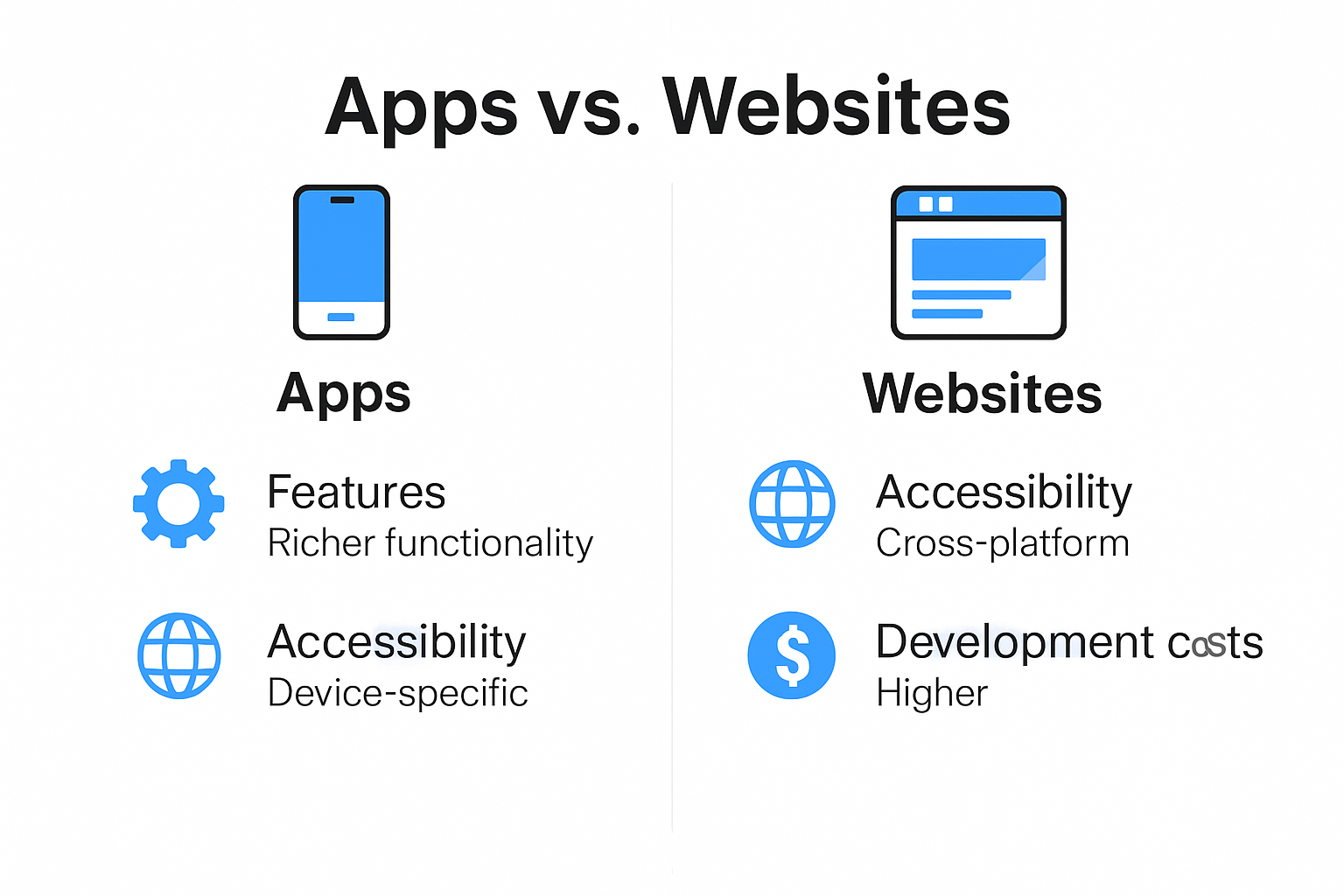Apps and websites are everywhere in South Africa. Did you know that mobile app usage has shot up so much, it’s grown exponentially over the past few years? Most people think the difference between an app and a website is just about downloading versus browsing. But the real surprise is how choosing one over the other can change everything for a business, from costs to how users interact and even how safe your info is. You’ll start to see why this isn’t just a technical choice but a decision with much bigger consequences.
Table of Contents
- What Defines An App And A Website?
- Why The Difference Between App And Website Matters
- How Apps And Websites Function And Interact
- Key Concepts: Features And Benefits Of Each
- Real-World Implications Of Choosing Between An App And A Website
Quick Summary
| Takeaway | Explanation |
|---|---|
| Choose between apps and websites wisely | Selecting the right platform significantly impacts user engagement, business performance, and strategic objectives. |
| Websites offer universal accessibility | Websites are accessible on multiple devices, allowing broader audience reach without additional installations. |
| Apps provide deeper user engagement | Mobile applications can create personalised, immersive experiences that foster higher user retention. |
| Consider development costs carefully | While apps may require higher initial investments, they could offer better long-term returns through advanced functionalities. |
| Evaluate audience needs and preferences | Tailoring digital strategies to audience technological preferences ensures better alignment with user expectations and operational goals. |
What Defines an App and a Website?
Understanding the fundamental differences between apps and websites requires a nuanced exploration of their technological foundations, user interaction models, and functional purposes. While both digital platforms serve as critical communication and service delivery channels, they differ significantly in design, accessibility, and interaction capabilities.
Digital Platforms and Their Core Characteristics
At their essence, websites and apps represent two distinct approaches to digital engagement. Websites are collections of interconnected web pages accessible through internet browsers, designed primarily to provide information, showcase content, and enable basic user interactions. They exist in the digital realm as HTML, CSS, and JavaScript-based experiences that render through standard web browsers like Chrome, Firefox, or Safari.
To help you quickly understand the core differences between websites and apps, the following table summarises their main characteristics, advantages, and limitations.
| Aspect | Websites | Mobile Apps |
|---|---|---|
| Accessibility | Accessible on any device with a browser, no installation required | Download and install on specific devices |
| Development Cost | Generally lower initial and maintenance costs | Higher development and maintenance costs |
| Device Integration | Limited access to device features | Deep integration (camera, GPS, etc.) |
| Offline Functionality | Usually require internet connection | Can function offline |
| User Experience | Universal, less personalised | More immersive and personalised |
| Reach | Broad; available to anyone online | Limited to users who install the app |
| Update Process | Updated instantly for all users | Each user must update app on their device |
Mobile and web applications, by contrast, are more sophisticated software solutions that offer deeper, more interactive experiences. Unlike websites, apps are typically:
- Downloadable and installable on specific devices (smartphones, tablets, computers)
- Capable of accessing device-specific hardware features
- Designed for more complex, integrated user experiences
- Often requiring specific platform permissions
Technical Architecture and Functionality
The technological infrastructure distinguishing apps from websites involves several critical factors. Websites predominantly operate through browser-based rendering, which means they rely on internet connectivity and browser compatibility for functionality. They are generally more lightweight and universally accessible across different devices and platforms.
Applications, however, are built with more complex programming languages and frameworks specific to operating systems like iOS (Swift) or Android (Kotlin). They can function offline, provide push notifications, integrate directly with device features like cameras and GPS, and offer more seamless, responsive user experiences.
According to Statista, mobile app usage continues to grow exponentially, highlighting the increasing preference for more integrated digital experiences that apps provide compared to traditional websites.
Ultimately, the choice between developing a website or an app depends on specific business objectives, target audience needs, and desired user interaction complexity.
Why the Difference Between App and Website Matters
The distinction between apps and websites transcends mere technological nuance. For businesses and users alike, understanding these differences can significantly impact digital strategy, user experience, engagement, and ultimately, organisational success.
Strategic Digital Presence and User Experience
Business digital strategies are fundamentally shaped by choosing between an app or website. Each platform offers unique advantages that directly influence customer interaction, brand perception, and operational efficiency. Websites provide broad accessibility and universal reach, while apps deliver more personalised, immersive experiences.
Key strategic considerations include:
- Target audience technological preferences
- Required level of user interaction complexity
- Specific functional requirements for digital solution
- Budget and development resources available
Performance and Technical Capabilities
The performance differential between apps and websites extends beyond simple functionality. Apps typically offer superior performance by leveraging device-specific hardware, enabling faster data processing, more responsive interfaces, and seamless offline functionality.
Websites, while universally accessible, are constrained by browser limitations and internet connectivity. They provide broader compatibility but often compromise on performance and depth of user engagement compared to native applications.
According to Northeastern University research, technological choices also impact critical aspects like data privacy and information security, with significant variations in how different digital platforms handle user data.
Business and User Perspective
Selecting between an app and website is not merely a technical decision but a strategic business choice. Businesses must align their digital platform selection with specific organisational goals, target audience needs, and available technological resources.
Small businesses might find websites more cost-effective and easier to maintain, while enterprises requiring complex, feature-rich interactions may prioritise custom mobile applications. Understanding these nuanced differences enables organisations to make informed digital investment decisions that truly serve their unique operational requirements.
How Apps and Websites Function and Interact
The technological ecosystems of apps and websites operate through fundamentally different architectural approaches, each with unique mechanisms for data processing, user interaction, and system integration. Understanding these intricate functional differences reveals the sophisticated engineering behind digital platforms.
Technical Infrastructure and Communication Protocols
Websites rely on standard internet communication protocols such as HTTP and HTTPS, enabling content delivery through web browsers. These platforms use client server models where web servers transmit HTML, CSS, and JavaScript files that browsers render into interactive experiences. Web applications extend this model by introducing more complex server side processing and dynamic content generation.
Key communication characteristics include:
- Stateless HTTP request response mechanisms
- Browser dependent rendering processes
- Universal accessibility across multiple devices
- Dependency on continuous internet connectivity
Device Integration and Interaction Mechanisms
Applications differentiate themselves through deeper device integration capabilities. Native mobile apps leverage platform specific software development kits (SDKs) enabling direct interaction with device hardware like cameras, GPS, accelerometers, and push notification systems. This allows for more sophisticated, contextually aware user experiences.
In contrast, websites operate within browser sandboxes with limited hardware access, restricting their ability to provide similarly immersive interactions. Modern web technologies like Progressive Web Apps (PWAs) are bridging this technological gap by introducing more app like functionalities.
According to PeerJ Computer Science research, the fundamental architectural differences between websites and apps significantly impact their performance, user experience, and functional capabilities.
Data Processing and User Experience Dynamics
The interaction model determines how data is processed and presented to users. Websites typically process data through server side computations and browser rendering, while native apps can perform complex calculations directly on the device, enabling faster, more responsive interactions.
This architectural variation means apps can provide seamless offline experiences, sophisticated real time updates, and personalised interactions that websites struggle to replicate. The choice between developing an app or website ultimately depends on specific functional requirements, target user expectations, and technological constraints.
Key Concepts: Features and Benefits of Each
Navigating the digital landscape requires a comprehensive understanding of the unique capabilities and strategic advantages offered by websites and mobile applications. Each platform presents distinct features that can significantly impact user engagement, business performance, and digital strategy.
Below is a table outlining the key features and benefits of both websites and mobile applications, helping you evaluate which digital solution matches your business needs.
| Platform | Key Features | Benefits |
|---|---|---|
| Website | Universal access, easy updates, cross-platform compatibility | Broad reach, lower costs, SEO friendly |
| Mobile App | Push notifications, offline use, device integration | High engagement, personalisation, speed |
Websites: Universal Accessibility and Information Delivery
Websites excel in broad, democratic information distribution. They provide universal access across multiple devices and platforms, ensuring that content reaches the widest possible audience without requiring additional software installation.
Key website advantages include:

- Immediate accessibility through web browsers
- Lower development and maintenance costs
- Search engine optimisation capabilities
- Easier content updates and management
- Cross platform compatibility
Mobile Applications: Personalised and Immersive Experiences
Native mobile applications represent the pinnacle of personalised digital interaction. By leveraging device specific hardware and advanced software development kits, apps can create deeply engaging, context aware user experiences that websites cannot easily replicate.
Critical mobile app capabilities encompass:
- Direct hardware integration (camera, GPS, accelerometers)
- Offline functionality and data caching
- Push notification systems
- Enhanced performance and responsiveness
- Advanced user personalisation
According to Northeastern University research, the technological approach of websites and apps fundamentally differs in data handling and user privacy mechanisms.
Strategic Selection and User Experience Optimization
The selection between a website and mobile application is not a binary choice but a strategic decision. Businesses must carefully evaluate their specific goals, target audience technological preferences, and desired user interaction complexity.
Modern digital strategies often incorporate hybrid approaches, using responsive websites and complementary mobile applications to create comprehensive, multi platform user experiences. The key is understanding that each platform offers unique strengths which, when strategically combined, can deliver exceptional digital solutions tailored to specific business requirements.

Real-World Implications of Choosing Between an App and a Website
The decision between developing a website or a mobile application carries profound strategic implications that extend far beyond technical considerations. These choices directly impact user engagement, business performance, brand perception, and long term digital sustainability.
Business Performance and User Engagement
Digital platform selection fundamentally influences organisational reach and customer interaction dynamics. Websites offer universal accessibility, enabling businesses to connect with broader audiences without technological barriers. Mobile applications, by contrast, provide deeper, more personalised engagement mechanisms that can significantly enhance user retention and loyalty.
Critical performance considerations include:
- Conversion rate variations between platforms
- Customer acquisition costs
- User interaction depth and quality
- Data collection and personalisation capabilities
- Platform specific user behaviour patterns
Economic and Resource Allocation
The financial implications of choosing between a website and an app are substantial. Mobile applications typically require higher initial development investments and ongoing maintenance costs compared to responsive websites. However, they can generate more substantial returns through enhanced user experiences and platform specific monetisation strategies.
Small to medium enterprises must carefully evaluate their technological investments, considering factors like target audience technological sophistication, budget constraints, and potential long term digital strategy scalability.
According to Northeastern University research, technological platform choices also significantly impact data privacy and user information management strategies.
Strategic Digital Ecosystem Design
Modern businesses increasingly recognise the value of integrated, multi platform digital experiences. Our comprehensive mobile app development guide highlights the importance of creating complementary digital solutions that leverage both websites and applications.
Successful digital strategies now involve crafting holistic ecosystems where websites and mobile applications work synergistically. This approach allows organisations to maximise user engagement, provide seamless cross platform experiences, and adapt dynamically to evolving technological landscapes and user expectations.
Unlock the Right Digital Solution for Your Business
Are you feeling uncertain about whether your business needs a website or a mobile app? After exploring the article, you might recognise that making the wrong choice can impact your reach, customer engagement, and operational efficiency. Many businesses struggle to balance wide accessibility with deep user interaction, and the confusion between websites and mobile apps can stall digital growth. If you need to combine universal access with personalised experiences, now is the time to get expert help tailored to your industry and users.
Take the next step towards a future-proof digital presence. At Cloudfusion, our team helps you bridge the gap between informative websites and powerful mobile applications. Ready to transform your vision into a custom solution that suits your goals and budget? Visit our web design and development quotation page to start a personalised consultation. See how we blend technical expertise and innovation for businesses across South Africa. Do not wait until competitors take the lead. Reach out now and unlock your potential.
Frequently Asked Questions
What is the main difference between an app and a website?
Websites are collections of interconnected pages accessible via browsers, mainly for information and basic interactions. Apps, however, are downloadable software designed for deeper, more interactive experiences on specific devices.
Can websites and apps work together?
Yes, modern businesses often use a combination of both websites and apps to create a comprehensive digital strategy. This allows for seamless user experiences across platforms and maximizes engagement.
How does user interaction differ between apps and websites?
Apps typically offer more personalised and immersive experiences by leveraging device features and functionality, while websites are more accessible but may not provide the same depth of interaction.
Which platform is more cost-effective for small businesses, apps or websites?
Generally, websites are more cost-effective for small businesses due to lower development and maintenance costs. However, the choice depends on specific business needs and long-term digital strategies.








